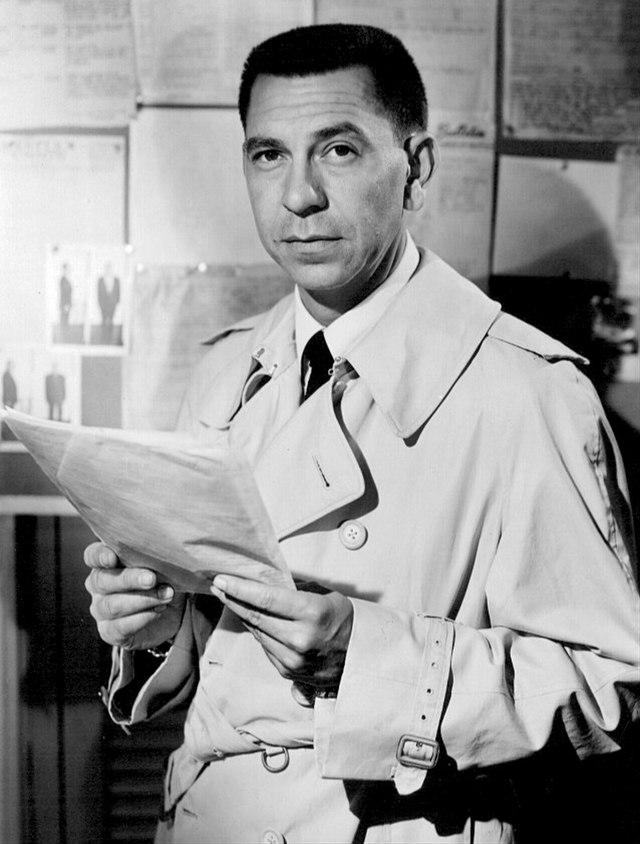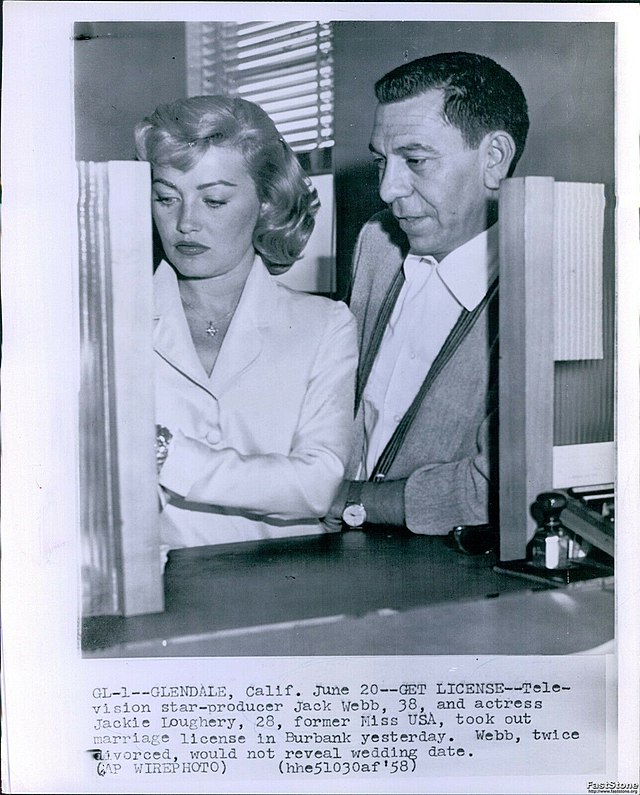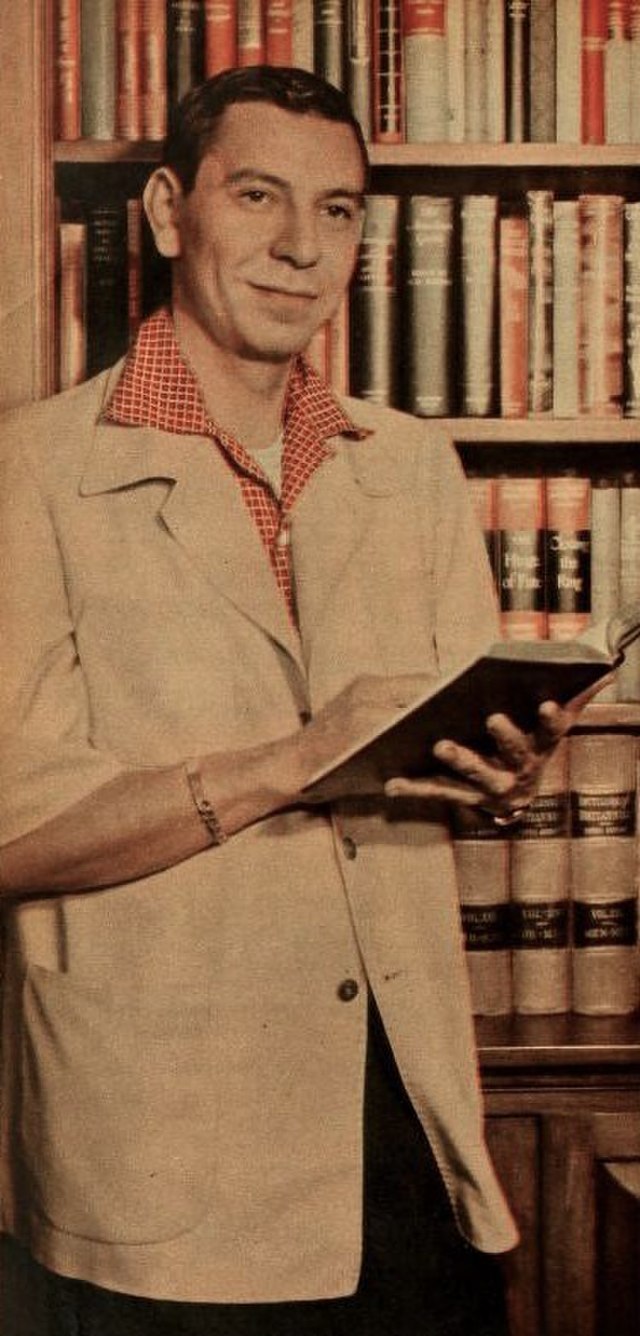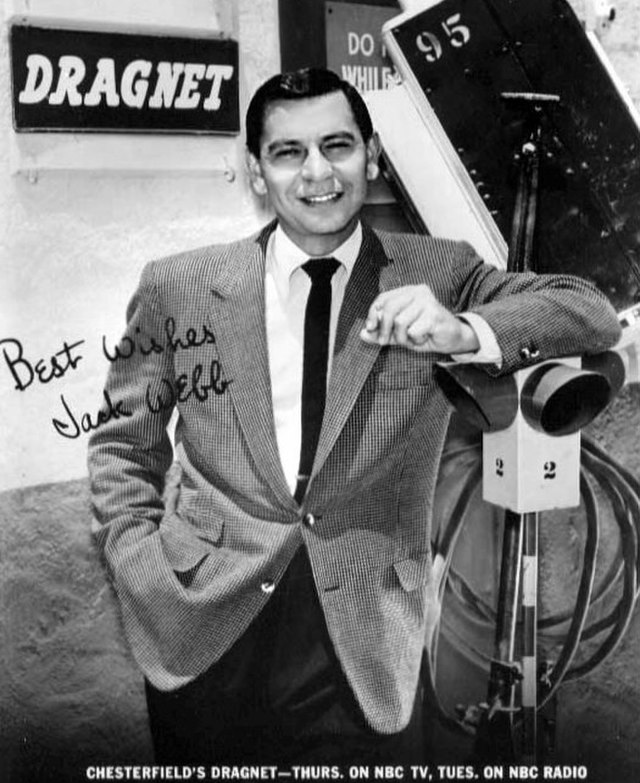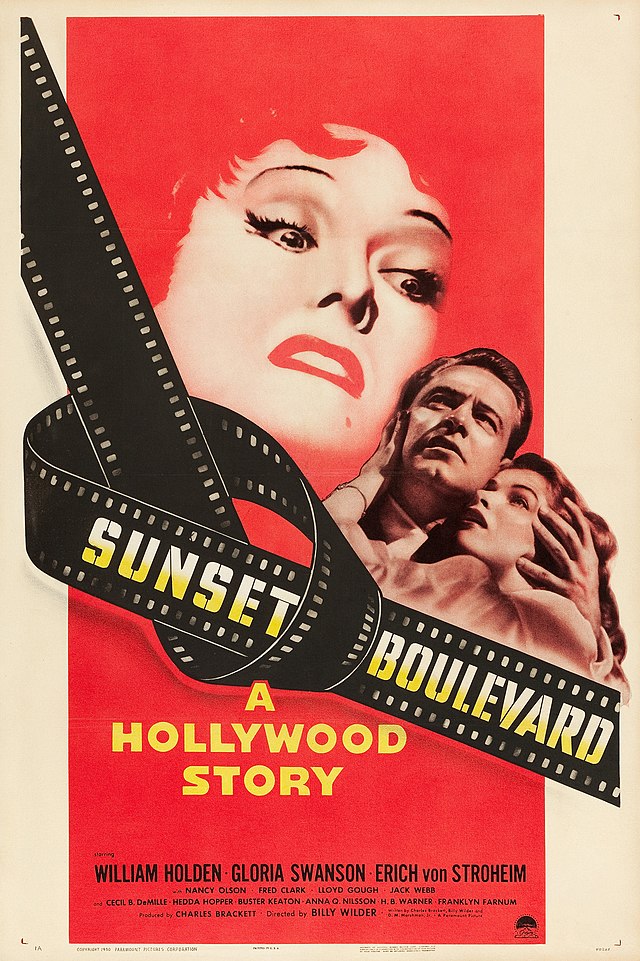Jack Webb
back| Full Name | John Randolph Webb |
| Stage Name | Jack Webb |
| Born | April 2, 1920 |
| Birthplace | Santa Monica, California, USA |
| Died | December 23, 1982 |
| Buried | Forest Lawn Memorial Park, Glendale, California |
| Married to | Julie London (1947–1954, divorced) - Dorothy Towne (1955–1957, divorced) |
| Children | Stacy Webb (daughter, with Julie London) |
| Notable films | Dragnet (1954) - The D.I. (1957) - Sunset Boulevard (1950) |
Jack Webb
The Voice of Authority
Jack Webb (1920–1982) was an American actor, producer, and director best known for creating and starring in Dragnet, the groundbreaking police procedural that defined his career. Born in Santa Monica, California, Webb began in radio before transitioning to film and television, where his understated, no-nonsense acting style became his trademark.
As Sgt. Joe Friday, he delivered iconic lines and emphasized realism, discipline, and public service. He founded Mark VII Limited, producing other hits like Adam-12 and Emergency!.
A lifelong supporter of law enforcement, he was honored with two stars on the Hollywood Walk of Fame and had LAPD badge number 714 retired in his memory. Webb died of a heart attack in 1982 at age 62, leaving behind a legacy of innovation in television storytelling.
Related
Jack Webb (1920 – 1982)
Biography and Film Career
John Randolph "Jack" Webb was born on April 2, 1920, in Santa Monica, California. He would go on to become one of the most iconic figures in American radio and television history, best known for creating and starring in the groundbreaking police procedural Dragnet. His work helped define the genre and left an indelible mark on how law enforcement was portrayed in media.
Early Life and Upbringing
Jack Webb’s early life was marked by hardship. His father, Samuel Chester Webb, left the family before Jack was a year old. Raised by his mother, Margaret Smith, in the working-class neighborhoods of Los Angeles, Jack grew up during the Great Depression. The economic struggle shaped much of his later worldview and his respect for public servants and authority figures.
Webb attended Belmont High School in Los Angeles, where he showed an early interest in literature and the arts. After graduation, he briefly studied at St. John’s University in Minnesota before returning to Los Angeles to attend Los Angeles City College, where he initially aspired to be an artist or writer. Though he never completed a degree, his time in college honed his skills in storytelling, dialogue, and structure—skills that would later define his career.
Military Service and Early Career in Radio
During World War II, Webb enlisted in the United States Army Air Forces but was discharged before seeing combat due to color blindness. Returning to civilian life, he gravitated toward radio work, which was exploding in popularity in the 1940s.
He found early success with the radio drama "Pat Novak for Hire", a gritty, noir-inspired series where he played a tough-talking private eye. His deep, clipped delivery, understated presence, and ear for realistic dialogue quickly distinguished him from his contemporaries. These qualities would become hallmarks of his later work.
Dragnet and the Rise to Fame
Jack Webb's defining achievement came in 1949, when he launched Dragnet on radio. Inspired by his growing interest in police work and determined to depict it as accurately and respectfully as possible, Webb collaborated with the Los Angeles Police Department to ensure authenticity. The result was a stark, methodical portrayal of police investigations, stripped of sensationalism.
Webb's character, Sergeant Joe Friday, was the embodiment of professionalism and stoicism. When Dragnet moved to television in 1951, its realistic tone and semi-documentary style revolutionized the crime drama genre. Webb’s signature line—“Just the facts, ma’am”—although never said verbatim in the show, became iconic.
He not only starred in Dragnet but also produced and directed it, showcasing his wide-ranging talents and commitment to creative control. In 1954, he directed and starred in a feature film adaptation of Dragnet, further solidifying the franchise’s place in American pop culture.
Film Work and Other Ventures
Beyond Dragnet, Webb directed several films in the 1950s, often exploring themes of duty and discipline:
- The D.I. (1957), in which he played a hard-edged Marine drill instructor, was praised for its realism and intensity.
- Pete Kelly’s Blues (1955), a jazz-era crime drama, revealed another of Webb's lifelong passions: jazz music.
Webb was a devoted jazz enthusiast and even released albums under his name, though he was more of a promoter than a musician himself. Pete Kelly’s Blues combined his love of music with his noir sensibility, and it later became a short-lived television series.
Marriages and Personal Life
Webb’s personal life was often as intense and disciplined as his on-screen persona. He was married twice:
- His first marriage was to Julie London, a sultry-voiced jazz singer and actress. The two shared a love of music and Hollywood nightlife, but their marriage, which lasted from 1947 to 1954, was tumultuous and eventually ended in divorce. They had two daughters together, including Stacy Webb. London would later marry musician Bobby Troup, and the three remained on good terms professionally—Webb cast both in his later TV series Emergency!.
- Webb’s second marriage was to Dorothy Towne, a former secretary. It was much shorter, lasting from 1955 to 1957, and ended without children.
Webb was known for being both intensely private and obsessively professional. He worked long hours, was meticulous about scripts and direction, and maintained close relationships with members of the LAPD, who often served as technical advisors on his projects. Though he never remarried after his second divorce, he maintained several long-term relationships and was known to be a generous friend and mentor within the industry.
Later Career: Mark VII Limited and Television Legacy
In the late 1960s, Webb revived Dragnet in color, bringing back Joe Friday for a new audience. This version of the show aired from 1967 to 1970 and retained much of the original's spare, documentary feel. Though seen as stiff and old-fashioned by some, it introduced Webb’s moral clarity to a generation living through a time of social upheaval.
Webb also created and produced other series through his production company, Mark VII Limited, including:
- Adam-12 (1968–1975): A procedural focused on uniformed police officers.
- Emergency! (1972–1977): A drama centered on paramedics and firefighters, again emphasizing realism and public service.
These shows further cemented his image as a champion of unsung everyday heroes.
Passions and Personality
Jack Webb was an intensely driven man. His perfectionism sometimes alienated colleagues, but it also earned him deep respect. He had an encyclopedic knowledge of police procedure and was known for rewriting scripts late into the night to ensure accuracy and pacing.
Jazz remained a lifelong passion. His personal record collection was vast, and he often used jazz music in his productions. His taste ran toward the traditional and big-band styles, especially Dixieland jazz.
Though a heavy smoker for most of his life, Webb maintained a clean-cut public image. He rarely drank, had no criminal record, and preferred to avoid Hollywood’s wilder parties. His sense of discipline mirrored the law enforcement characters he portrayed.
Death and Legacy
On December 23, 1982, Jack Webb died of a massive heart attack at his home in Los Angeles. He was 62 years old. His death came as a shock to many, though his declining health—exacerbated by years of smoking and overwork—had become apparent in his final years.
In honor of his contributions, the Los Angeles Police Department gave him a rare civilian sendoff, retiring the badge number 714, the one worn by Joe Friday in Dragnet. He was buried at Forest Lawn Memorial Park in Glendale, California, a resting place for many of Hollywood’s greatest icons.
Conclusion
Jack Webb’s legacy lies not just in his iconic role as Joe Friday, but in his pioneering work as a creator, producer, and director. He transformed the police procedural into a respected genre and introduced generations of Americans to the value of duty, professionalism, and public service. Despite personal struggles and an austere public image, Webb was a passionate, talented figure whose influence is still felt in modern television today.
Jack Webb’s Funeral
Jack Webb’s funeral was a rare and solemn tribute that reflected the deep respect he had earned from the Los Angeles Police Department (LAPD) and the television industry. Although he was not a police officer, Webb had portrayed and honored law enforcement with such commitment and authenticity that he was treated with honors typically reserved for actual police personnel.
Here are the key details and notable elements of Jack Webb’s funeral:
Date and Place
- Date of Death: December 23, 1982
- Funeral Held: Shortly after, in late December 1982
- Burial Site: Forest Lawn Memorial Park, Glendale, California
- A resting place for many prominent figures in entertainment.
LAPD Tribute and Honors
- The LAPD gave Webb full police honors—a highly unusual gesture for a civilian.
- Honor Guard: A police honor guard was present at the ceremony.
- Police Bugler and Flag Detail: Traditional elements of a police funeral were included, such as a flag-draped casket, taps, and salutes from uniformed officers.
- Badge Number Retirement:
- The LAPD retired badge number 714, the fictional badge worn by Webb’s character Sgt. Joe Friday in Dragnet.
- This was an unprecedented honor, symbolizing how closely Webb had become identified with the values of the department.
Tone and Legacy
- The funeral was respectful and formal, much like Webb himself.
- It underscored the unique bond he shared with the law enforcement community, which had trusted him to represent their work truthfully and honorably.
- Police Chief Daryl Gates and other LAPD officials spoke about Webb's unwavering commitment to portraying police officers with dignity.
Posthumous Impact
- After the funeral, tributes poured in from across the country.
- The LAPD and other law enforcement agencies recognized Webb not just as an entertainer, but as a cultural ambassador for their profession.
- Television retrospectives honored him as a pioneer of factual, disciplined storytelling in an era of sensationalism.
Jack Webb – Physical Characteristics
- Height: Approximately 5 feet 10 inches (178 cm)
- Weight: Estimated around 165–175 lbs (75–79 kg) during his peak career years
- Build: Medium to slim, with a trim frame often accentuated by tailored suits or uniforms on-screen
- Hair: Dark brown to black, later graying; always neatly styled
- Eyes: Brown
- Face: Square-jawed, with a serious, no-nonsense expression; often seen with a furrowed brow
- Voice: Distinctively deep, flat, and deliberate, a major part of his acting style
Jack Webb Net Worth (Estimation)
At the time of his death in 1982, Jack Webb's estimated net worth was around $10 million (equivalent to roughly $30–35 million today when adjusted for inflation).
Sources of Wealth:
- Television Success:
Webb was not just an actor but also a producer, director, and writer. His ownership of his production company, Mark VII Limited, gave him control over multiple hit TV shows like:- Dragnet
- Adam-12
- Emergency!
- Syndication and Licensing:
- His shows were widely syndicated, especially Dragnet, which generated long-term residuals and licensing income.
- Film Work:
- While less financially dominant than his TV work, his films (The D.I., Pete Kelly’s Blues, Dragnet) added to his earnings, especially those he directed and produced.
- Music Publishing and Jazz Interests:
- Webb had a strong interest in jazz and released several albums; though not major commercial hits, they reflected his diversified interests.
Jack Webb as Sgt. Joe Friday
Jack Webb’s Acting Style
Jack Webb’s acting style was one of the most distinctive in American television history—often understated, frequently imitated, and deeply intentional. He wasn’t a traditionally “expressive” actor. Instead, he crafted a style that was shaped by his dedication to realism, professionalism, and minimalism.
A Blueprint for Procedural Realism
At the heart of Jack Webb’s acting was a belief that drama should mirror real life, particularly in how people in uniform—like police officers—speak and behave. This led to his famously terse, stripped-down delivery: sentences were clipped, inflection was minimal, and emotion was almost entirely internalized.
In Dragnet, where he played Sergeant Joe Friday, Webb often delivered lines in a monotone that verged on flatness. But this wasn’t because he lacked range—it was because he believed that real detectives didn’t overact or react with drama. They processed facts, managed tension, and stayed in control. Webb’s performance captured that.
The Voice of Duty
His voice was a key part of his persona: measured, calm, authoritative. He used pauses and precise diction to command attention. Even when interrogating suspects or addressing the public in voiceover, his tone rarely shifted. Instead of emotional highs and lows, he created drama through rhythm, pacing, and unflinching seriousness.
This gave him an almost documentary-like presence. Viewers felt like they were watching a reenactment, not a performance. That was exactly what Webb wanted.
Emotion Without Display
Webb’s emotional range was narrow by design. He didn’t play vulnerability, anger, or sorrow in obvious ways. Instead, he embodied a kind of quiet stoicism—the weary resolve of a man who had seen too much and carried the burden of duty without complaint. His characters often seemed emotionally distant, but it was a conscious choice to reflect the emotional restraint expected of law enforcement.
Subtle cues—tightened posture, slight shifts in vocal tone, a hardening of the gaze—were how Webb showed inner tension or moral conflict. He didn’t invite empathy; he demanded respect.
Economy of Movement
Physically, Webb was as reserved as he was vocally. He rarely gestured or paced. He often stood still, hands on hips or in his pockets, calmly asserting control over the room. His stillness added weight to his words. When he did move, it was purposeful—never wasted.
This gave him a presence that was greater than his physical size, rooted in confidence and clarity.
Craft Over Charisma
Jack Webb was not interested in being a “star” in the traditional sense. He didn’t play charm or charisma. He played professionalism. His goal wasn’t to draw attention to himself, but to the story, the facts, and the system he was portraying.
His characters weren’t defined by personal backstories or complex emotions—they were defined by their roles: detective, investigator, public servant. He acted as if the uniform was the character, and everything else was secondary.
Notable Movie Lines
While Jack Webb was not known for delivering flashy or emotionally charged dialogue, his stoic, no-nonsense delivery made several lines memorable—especially in Dragnet. Many of his most quoted phrases reflect his terse, disciplined approach to law enforcement and communication.
Here are some of Jack Webb’s most memorable quotes:
Iconic and Famous Quotes
- “Just the facts, ma’am.”
- While this line became legendary, it was actually never spoken verbatim in the show.
- The closest line Webb often used was:
- “All we want are the facts, ma’am.”
- The misquoted version became a pop culture catchphrase thanks to comedians and impressionists.
From Dragnet (TV Series and Film)
- “I carry a badge.”
- A phrase that epitomized Webb’s reverence for law enforcement and became symbolic of the show's tone.
- “This is the city. Los Angeles, California.”
- The trademark opening line of many Dragnet episodes, delivered in Webb’s iconic deadpan voice.
- “My name’s Friday. I’m a cop.”
- This recurring introduction framed countless episodes and underscored his character’s professional identity.
- “It was Monday, July 5th. It was hot in Los Angeles. We were working the day watch out of Robbery Division.”
- This style of detailed time-stamped narration was a signature of Dragnet, reinforcing its documentary realism.
On Police Work (in character as Sgt. Joe Friday)
- “You know, the only thing that’s worse than a liar is a liar that’s also a hypocrite.”
- Reflects the moral tone of many Dragnet episodes, where Friday would gently lecture suspects or witnesses.
- “There are over five million people in Los Angeles; most of them are decent, law-abiding citizens. But there are others who aren’t. That’s where I come in.”
- A classic line summarizing the purpose of law enforcement as Dragnet portrayed it.
On Discipline and Duty
- “The job is the job. You don’t do it halfway.”
- Though not a single catchphrase, this line (and variations of it) captured the spirit of Jack Webb’s entire career—as a character and a creator.
Personal Quotes
- “We’re not trying to sell anyone anything. We’re just trying to show what really goes on.”
- Said about Dragnet and his approach to portraying police work with realism.
- “If it sounds like writing, I rewrite it.”
- A reflection of his desire for natural, authentic dialogue—a principle he rigorously enforced in his scripts.
- “Television can be a force for good. It can teach. It can inform. It can inspire.”
- This quote captures Webb’s vision for the medium as something more than just entertainment.
Awards and Recognition
Primetime Emmy Awards
- 1954 – Winner: Best Mystery, Action or Adventure Program
- Dragnet (TV Series)
- Recognized for excellence in television programming.
- 1955 – Nomination: Best Actor in a Leading Role (Continuing Character)
- For his portrayal of Sgt. Joe Friday in Dragnet.
- 1956 – Nomination: Best Continuing Performance by an Actor in a Leading Role
- Again for Dragnet.
Although Webb did not win individual acting Emmys, Dragnet as a program received acclaim for its innovation and authenticity.
Hollywood Walk of Fame
- Two Stars Awarded:
- Radio – Located at 7040 Hollywood Blvd
- Television – Located at 6728 Hollywood Blvd
Webb is one of the few entertainers to receive two separate stars, reflecting his contributions to both mediums.
Recognition by the Los Angeles Police Department
- Honorary LAPD Rank:
- Awarded the honorary title of Detective Sergeant, the same rank as his fictional counterpart, Joe Friday.
- Badge Number Retirement:
- The LAPD retired badge number 714—Joe Friday’s badge number—as a tribute after Webb's death in 1982.
- Funeral Honors:
- Jack Webb received full police honors at his funeral—extremely rare for a civilian. The department held a formal ceremony and eulogized him as a lifelong ally of law enforcement.
Other Honors and Legacy Recognitions
- Mark VII Limited Logo:
- His production company, Mark VII Limited, became iconic for its hammer-and-plate logo—a symbol of Webb's hands-on craftsmanship and emphasis on professionalism.
- TV Guide and Industry Accolades:
- Named by TV Guide and other industry publications as one of the most influential figures in the history of television for his work on Dragnet, Adam-12, and Emergency!.
- Library of Congress:
- Episodes of Dragnet have been preserved for their historical and cultural significance, particularly as early examples of police procedural storytelling.
Posthumous Recognition
- Television Hall of Fame (Nomination Consideration):
- Although not inducted formally during his lifetime, Webb has been cited multiple times as a pioneering influence in television history and frequently discussed as a deserving figure for future induction.
- Legacy in Pop Culture:
- His catchphrases ("Just the facts, ma’am") and style have been widely imitated and parodied, but also respected for their originality and discipline.
Jack Webb Movies
1932
Three on a Match (Uncredited Role)
Synopsis: A drama about three women who reunite after years apart, leading to tragic consequences. Webb appears briefly as a boy in a schoolyard.
1948
Hollow Triumph (Uncredited Role)
Synopsis: A man assumes the identity of his psychiatrist look-alike, leading to unforeseen complications. Webb plays a minor role.
He Walked by Night
Synopsis: A semi-documentary film noir about a police manhunt for a cunning criminal. Webb portrays Lee, a crime lab technician, marking one of his early significant roles.
1949
Sword in the Desert (Uncredited Role)
Synopsis: Set during the British Mandate of Palestine, the film follows a ship smuggling Jewish refugees. Webb has a minor role as Hoffman.
1950
The Men
Synopsis: A paralyzed war veteran struggles to adjust to civilian life. Webb plays Norm, a fellow patient.
Sunset Boulevard
Synopsis: A screenwriter becomes entangled with a faded silent film star. Webb portrays Artie Green, the screenwriter's friend.
Dark City
Synopsis: A group of gamblers becomes targets after a con goes wrong. Webb plays Augie, one of the gamblers.
1951
Halls of Montezuma
Synopsis: Marines recall their experiences during World War II. Webb appears as Correspondent Dickerman.
You're in the Navy Now
Synopsis: A comedic take on a Navy crew testing a new steam-powered ship. Webb plays Ensign Anthony "Tony" Barbo.
Appointment with Danger
Synopsis: A postal inspector investigates a murder linked to a mail robbery. Webb portrays Joe Regas, one of the criminals.
1954
Dragnet
Synopsis: A film adaptation of the popular TV series, following Sergeant Joe Friday as he investigates a brutal murder. Webb reprises his role as Friday and also directs.
1955
Pete Kelly's Blues
Synopsis: A jazz cornetist in 1920s Kansas City becomes involved with gangsters. Webb stars as Pete Kelly and directs the film.
1957
The D.I.
Synopsis: A Marine drill instructor faces challenges while training a troubled recruit. Webb plays Gunnery Sgt. Jim Moore and directs the film.
1959
-30-
Synopsis: A day in the life of a newspaper editor dealing with various crises. Webb stars as Sam Gatlin and directs the film.
1961
The Last Time I Saw Archie
Synopsis: A comedic tale of a charismatic man who manipulates his way through military life during World War II. Webb plays William "Bill" Bowers and directs the film.
1962
Red Nightmare (Short Film)
Synopsis: A man experiences life under a communist regime in a dream, highlighting the value of American freedoms. Webb serves as the narrator.
1967
Greyhounds of the Sea (Short Film)
Synopsis: A documentary-style film about the U.S. Navy's destroyer fleet. Webb provides narration.

